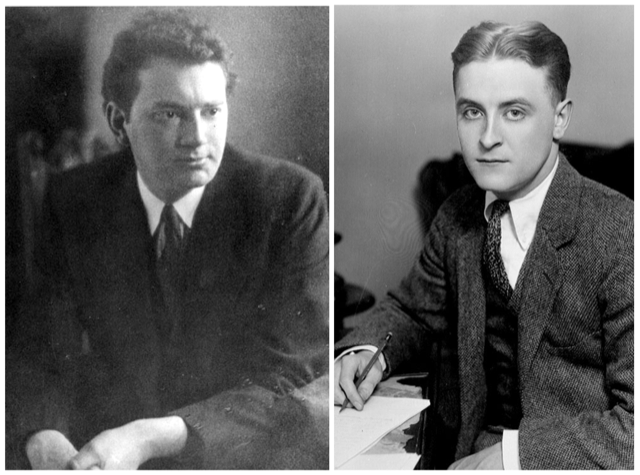In 1930, following the publication of his debut novel, Look Homeward, Angel, Thomas Wolfe received a $2,500 fellowship through the Guggenheim Foundation, permitting the author to travel, write and conduct creative research abroad.
Wolfe set sail for Europe that May. The following month, while living in Paris, he met fellow writer F. Scott Fitzgerald for the first time. The meeting was arranged by the authors’ shared editor, Maxwell Perkins.
On July 1, 1930, Wolfe wrote to Perkins, recalling his visit with Fitzgerald. According to Wolfe, the two writers spent much of the afternoon talking and drinking. The topics of conversation ranged from issues of the American spirit to more personal matters, including trauma. “[Scott] told me that Mrs. [Zelda] Fitzgerald has been very sick — a bad nervous breakdown — and he has her in a sanitarium at Geneva,” Wolfe informed his editor.
Later that summer, while in Switzerland, the two men crossed paths again. This time around, it was Fitzgerald who wrote Perkins about the meeting. Several times in the correspondence, Fitzgerald measured Wolfe’s talents against that of Ernest Hemingway, another of Perkins’ writers.
“You have a great find in [Wolfe] — what he’ll do is incalculable. He has a deeper culture than Ernest and more vitality, if he is slightly less of a poet and goes with the immense surface of wants to cover. Also he lacks Ernests quality of a stick hardened in the fire — he is more susceptible to the world.”
Fitzgerald and Wolfe remained on each other’s minds and in each other’s letters throughout much of the 1930s.
Such was the case on Sept. 25, 1936, when the New York Post published “The Other Side of Paradise, Scott Fitzgerald, 40, Engulfed in Despair.” The article began:
“The poet-prophet of the post-war neurotics observed his 40th birthday yesterday in his bedroom of the Grove Park Inn here. He spent the day as he spends all his days — trying to come back from the other side of paradise, the hell of despondency in which he has writhed for the last couple of years.”
The scathing profile and the subsequent gossip it generated led Fitzgerald to attempt suicide inside his Asheville hotel room.
On Oct. 14, 1936, Wolfe addressed the matter in a letter to fellow writer and friend Hamilton Basso. “I feel pretty bad about Scott,” he stated. “I had thought of asking my mother to go round and see him … but I don’t know how much good it would do.”
Angered by the article, Wolfe lampooned the New York Post, writing:
“I can’t see what possible news value it has — what possible public service it can achieve — why the illness, alcoholism, mental ill health of a writer, together with the mental illness of his wife, is a matter that should be aired for the instruction of the American public.”
Despite Wolfe coming to Fitzgerald’s defense in 1936, the two authors would butt heads the following summer. On July 19, 1937, Fitzgerald wrote Wolfe from Los Angeles, offering unsolicited advice about his writing. Among his many suggestions, Fitzgerald advised Wolfe to “cultivate an alter ego, a more conscious artist in you.”
A week later, Wolfe responded to Fitzgerald, noting: “I was surprised to hear from you but I don’t know that I can truthfully say I was delighted. Your bouquet arrived smelling sweetly of roses but cunningly concealing several large-sized brickbats.”
Later in Wolfe’s lengthy response, the writer finally addressed the matter head-on:
“I have read your letter several times and I’ve got to admit it doesn’t seem to mean much. … I may be wrong but all I can get out of it is that you think I’d be a good writer if I were an altogether different writer from the writer that I am.
“This may be true but I don’t see what I’m going to do about it, and I don’t think you can show me.”
Editor’s note: Peculiarities of spelling and punctuation are preserved from the original documents.






Before you comment
The comments section is here to provide a platform for civil dialogue on the issues we face together as a local community. Xpress is committed to offering this platform for all voices, but when the tone of the discussion gets nasty or strays off topic, we believe many people choose not to participate. Xpress editors are determined to moderate comments to ensure a constructive interchange is maintained. All comments judged not to be in keeping with the spirit of civil discourse will be removed and repeat violators will be banned. See here for our terms of service. Thank you for being part of this effort to promote respectful discussion.